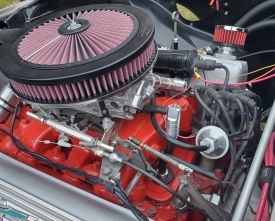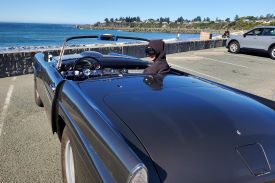|
Author
|
Message
|
|
Brent
|
|
|
Group: Forum Members
Last Active: 10 Months Ago
Posts: 142,
Visits: 1.5K
|
I get it on Amazon. Search for: Valvoline 10w40
Valvoline™ Daily Protection SAE 10W-40 Conventional Motor Oil 5 QT is $32
I get ZDDPplus there as well

.150 Stroked Y-Block:327.25 ci @ >1hp per ci
 
|
|
|
|
|
slumlord444
|
|
|
Group: Forum Members
Last Active: 2 Months Ago
Posts: 1.2K,
Visits: 137.8K
|
Valvolene Vr1 racing oil in the weight of your choice. Amazon or any parts store should be able to order it if they don’t stock it.
|
|
|
|
|
2721955meteor
|
|
|
Group: Forum Members
Last Active: Last Year
Posts: 927,
Visits: 190.0K
|
slumlord444 (8/12/2023)
Valvolene Vr1 racing oil in the weight of your choice. Amazon or any parts store should be able to order it if they don’t stock it. racing oil is a no. what is wrong with 10/30. my 292 y has had 10/30 since rebuild5years ago.. ther are several tests on engine oils that show little to no difference. and as well racing oil is designed for a short life under heavy loads.IF YOU LIVE IN CANADA SEND ME YOUR ADRESS AND A STAMPED ENVELOPE AND I WILL SEND A COPPEY. CLIFF TATE 2618 Natalie rd Shawnigan Lake bc. vor2w2
|
|
|
|
|
DryLakesRacer
|
|
|
Group: Forum Members
Last Active: Last Month
Posts: 1.7K,
Visits: 340.1K
|
I agree with meteor. There is really no reason to use racing oil of any kind and actually not recommended by manufacturers. There are quite of few brands listing “Hot Rod” or Classic car oils for engines and blended for them. Fords recommended SAE 20 or 20w oil for our engines right on the inside of the glove box on a sticker. Single weight oils are not easily available so a 10-30 would be my call in any case. Lucas, Castro, Quakerstate, etc all have blends for our older engines and list proper Zinc amounts. Personally the key is to use our vehicles long enough to get them properly heated and oil to the temperature it’s designed to have proper flow characteristics especially to the cylinder head rocker arms.
56 Vic, B'Ville 200 MPH Club Member, So Cal.
|
|
|
|
|
FORD DEARBORN
|
|
|
Group: Forum Members
Last Active: Yesterday
Posts: 789,
Visits: 113.4K
|
If I did this right, the link should open the data sheets for conventional Valvoline motor oil showing zinc etc. content. 10W30 for the most part is what I used through the years in my Y-block and always had excellent oil pressure no mater the ambient temperature. I always add a 4oz. bottle of zinc supplement but that is probably not necessary. If the link doesn't work, maybe someone can post it correctly. Removed non-functional link.
64F100 57FAIRLANE500
|
|
|
|
|
FORD DEARBORN
|
|
|
Group: Forum Members
Last Active: Yesterday
Posts: 789,
Visits: 113.4K
|
Sorry guys, I don't know why the link doesn't opoen correctly like it does on my computer.
64F100 57FAIRLANE500
|
|
|
|
|
DANIEL TINDER
|
|
|
Group: Forum Members
Last Active: Yesterday
Posts: 1.7K,
Visits: 154.2K
|
DryLakesRacer (8/18/2023)
I agree with meteor. There is really no reason to use racing oil of any kind and actually not recommended by manufacturers. There are quite of few brands listing “Hot Rod” or Classic car oils for engines and blended for them. Fords recommended SAE 20 or 20w oil for our engines right on the inside of the glove box on a sticker. Single weight oils are not easily available so a 10-30 would be my call in any case. Lucas, Castro, Quakerstate, etc all have blends for our older engines and list proper Zinc amounts. Personally the key is to use our vehicles long enough to get them properly heated and oil to the temperature it’s designed to have proper flow characteristics especially to the cylinder head rocker arms. Just curious: With sole focus on traditional minimum pressure recommendation (10 lbs. per 1000rpm), could someone remind me of likely consequences if less? (10W-40 vs. 10W-30). Too speedy evacuation of bearing spaces might promote metal contact? Or, might the benefits of increased circulation (cooling) outweigh risk of slightly bending the min. rule? How much of that rule is evidence based, vs. supposition/tradition?
6 VOLTS/POS. GRD. NW INDIANA
|
|
|
|
|
Ted
|
|
|
Group: Administrators
Last Active: 2 days ago
Posts: 7.5K,
Visits: 205.8K
|
DANIEL TINDER (8/18/2023)
DryLakesRacer (8/18/2023)
I agree with meteor. There is really no reason to use racing oil of any kind and actually not recommended by manufacturers. There are quite of few brands listing “Hot Rod” or Classic car oils for engines and blended for them. Fords recommended SAE 20 or 20w oil for our engines right on the inside of the glove box on a sticker. Single weight oils are not easily available so a 10-30 would be my call in any case. Lucas, Castro, Quakerstate, etc all have blends for our older engines and list proper Zinc amounts. Personally the key is to use our vehicles long enough to get them properly heated and oil to the temperature it’s designed to have proper flow characteristics especially to the cylinder head rocker arms. Just curious:
With sole focus on traditional minimum pressure recommendation (10 lbs. per 1000rpm), could someone remind me of likely consequences if less? (10W-40 vs. 10W-30).
Too speedy evacuation of bearing spaces might promote metal contact? Or, might the benefits of increased circulation (cooling) outweigh risk of slightly bending the min. rule? How much of that rule is evidence based, vs. supposition/tradition? Early morning thoughts on the subject. The 10# per 1000 rpm for engine oil pressure is just a generalized rule that if followed, ensures no advanced bearing or journal wear. Some engines get by with less than this depending upon the internal clearances. Oil pressure is simply a result of restrictions to the oil flow so having no oil pressure present does not necessarily mean that there is no oil. Just the opposite in fact as when oil flow is not inhibited, oil pressure will be low or not evident, but flow will be high. With all that being said, oil pressure is important. Oil must be at the bearings with enough pressure to generate a pressure wave between the bearing and the surface it rides on. No pressure, no wave. Bearing clearances and oil viscosity work in tandem with each other to create this pressure wave. Too much clearance and no pressure wave. Not enough viscosity in the oil and no pressure wave. It’s a fine balance for that pressure wave or oil film to be created and still not be so thick or heavy that the oil will not flow from the bearing. The oil flow must also be sufficient enough to carry the heat away from the rotating surface but not so inhibited that the bearing gets hot and prematurely fails. Using an oil with too much viscosity with bearing clearances that are too tight for that particular viscosity will have a tendency to overheat the bearings due to the oil not flowing fast enough to carry the heat away. Multi-weight oils were introduced in the early Fifties and helped to provide that balance in oil flow between cold starts and hot running. While the cold starting with 10W-30 and 10W-40 oil are similar, the 10W-40 oil would be more desirable in hotter climates and provide an extra degree of pressure protection to the bearings. When comparing oils from different companies, it’s important to realize that testing procedures and the ranges for the viscosity of their oils will not be standardized to each other. Viscosity ranges in these instances will vary and not be the same across the board. Company A with a 10W-40 oil may not be the same as Company B with the same advertised 10W-40 oil. That’s the reason when I did a oil viscosity test on the dyno, I used the same brand of oil throughout the test as using other brands of oil gave some conflicting numbers.
  Lorena, Texas (South of Waco) Lorena, Texas (South of Waco)
|
|
|
|
|
Tedlauri
|
|
|
Group: Forum Members
Last Active: 3 Months Ago
Posts: 40,
Visits: 11.3K
|
I have been using Valvoline VR1 20/50 in a 1956 pickup 272 with lots of miles on it. I'm in California heat but also drive in winter. Should I be using 10/40 instead of 20/50? Thoughts will be appreciated, Thanks
1956 F100 272 4 speed
Northern California
|
|
|
|
|
55blacktie
|
|
|
Group: Forum Members
Last Active: Yesterday
Posts: 1.2K,
Visits: 1.8K
|
I would prefer 10w-40, but I've been unable to find VR-1 10w-40 conventional oil. Amazon seems to have the best price/w free shipping on VR-1 10w-30. I, too, have read that VR-1 isn't recommended for non-race applications. Does it lack detergents? Personally, I don't want to use oil that has to be changed more frequently than yearly/every 3,000 miles, whatever comes first, but VR-1 does have a higher concentration of phosphorus and zinc than Daily Protection 10w-40 conventional.
|
|
|
|